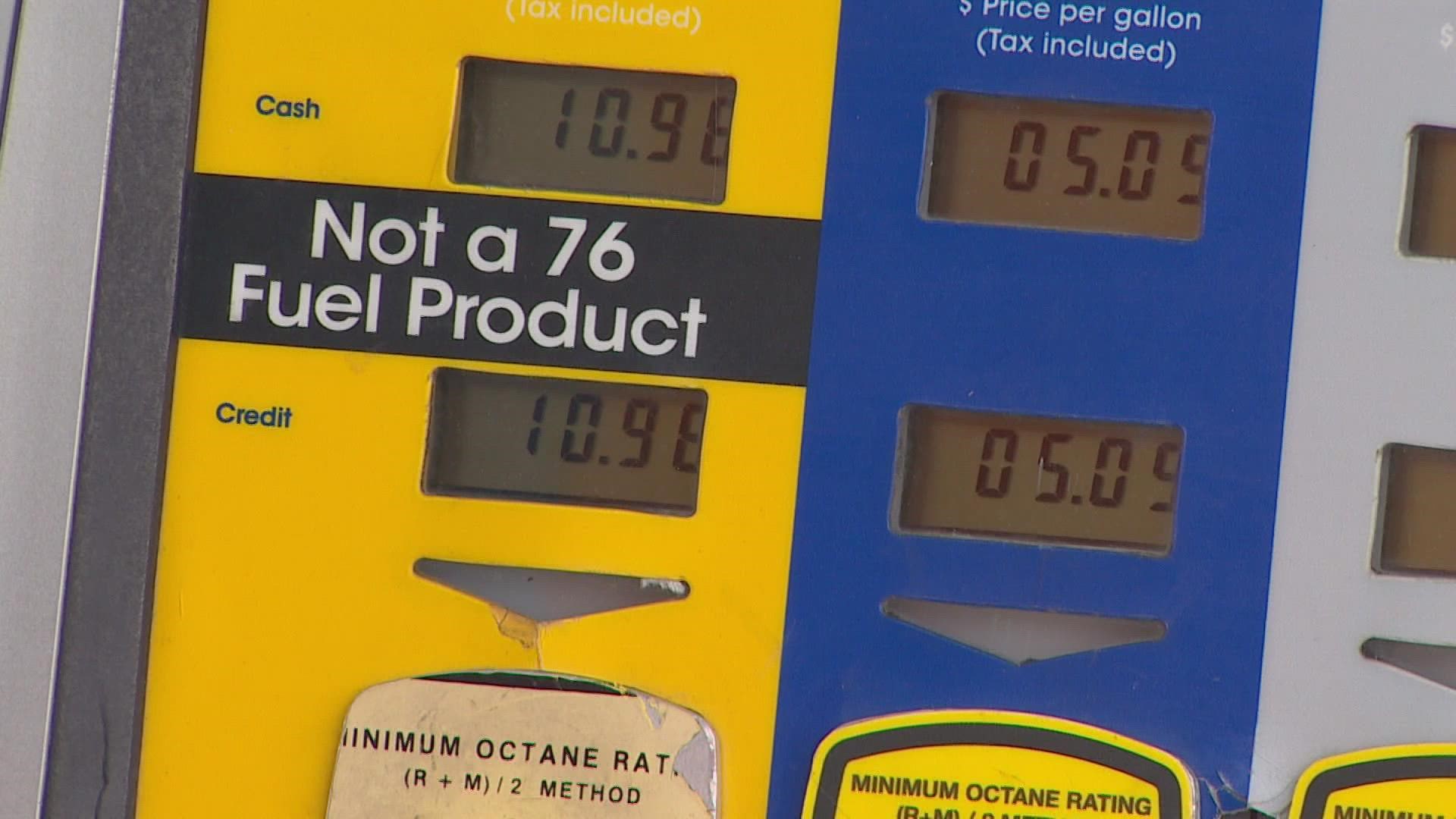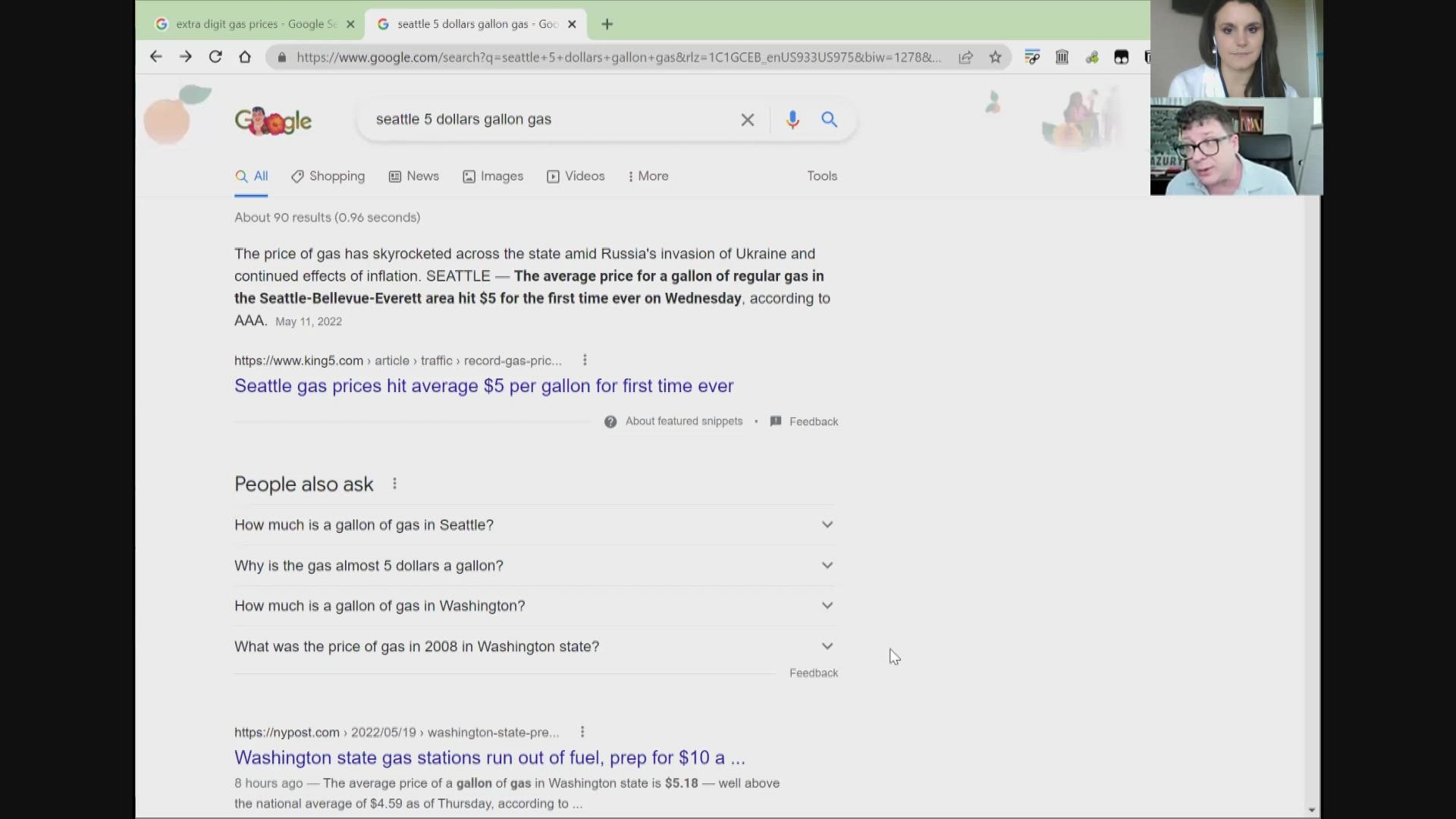AUBURN, Wash. — When an independent, family-owned gas station in Auburn added digits to pricing signs at its pumps, Small and Sons Operations Manager Jeff Small said it had no intention of sparking viral national headlines about Washington gas stations expecting $10-a-gallon gas prices.
"We have a specialty grade of fuel here and that's why we had to change the digits at the dispenser," Small said. "Now we've got all this attention, good or bad, and I'm getting tons of calls, all day, every day right now, and it's frustrating."
Small said the gas station is located near a race track and sells racing fuel that costs significantly more than regular gas. Prices for the fuel, like all gas prices, have been rising. Without enough digits to price it at $10 or to include tenths of pricing, the station was missing out on money.
"We've been trying to find a way to get it above ten dollars for a while now, we've kind of been losing money on it, because gas pumps, hardware, software, take time to reload, and offer those digits," Small said.
About a week after updating its pumps, it was contacted by a website asking about the change, with a headline citing gas stations "[adding] extra digit in anticipation of $10 dollar prices" and a description reading, "A spokesperson at 76 confirmed to The Post Millennial that the gas pumps were reprogrammed to allocate for double-digit pricing."
Small said he is not a spokesperson for the 76 company. He said he did speak with a reporter, emphasizing the racing fuel reasoning. The story did mention the race fuel reasoning several paragraphs in, saying "this specific gas station also sells race fuel which may have forced the reprogramming since it has also increased in pricing."
But the "$10-a-gallon" headline was picked up by other websites and social media pages, and Small said he began receiving nonstop calls asking for comment on his "prediction" that fuel prices would be rising significantly in the near future.
"It was pretty crazy, cause I told somebody over the phone exactly what I've told you, and to wake up and see the article completely spun in a different direction is really frustrating," Small said. "If this was a whole industry thing, we wouldn't be the only station in America with the digit switch ... that's what I've been trying to tell people. There's no insight here, just race fuel."
As for the assertion of gas shortages across the state, KING 5 reached out to several companies and a petroleum association, but could not confirm any type of widespread shortage. A spokesperson for the Western States Petroleum Association said it also had not heard about a shortage, though it is possible some individual stations ran out of gas, like people reported via social media.
Tracking how information spreads
The University of Washington Center for an Informed Public works to study misinformation, promote an informed society and strengthen democratic discourse. Research scientist Mike Caulfield said an incentive for speed in reposting information has fueled the growth of viral stories that may or may not get the full picture.
"This is a pattern we see a lot," Caulfield said. "The way this one seems to have worked is there was a specific reason something was the case - in this case, the price of racing fuel - that is outside the expertise of almost anybody looking at it. Most people looking at it, that's not going to occur to them because they're not an expert at it but when people see the photo, and when they see the extra digit, they feel this is something they can intuitively understand."
In working to grab attention - and the response and interactions that can come with it - a nugget of information may become the headline, as was the case in this scenario, without providing the proper caveats, Caulfield said.
"A lot of times we see something that isn't necessarily entirely wrong but it's been miscontextualized, a crucial piece of context has been removed," Caulfield said. "The point is, whether it's due to a misunderstanding, or whether it's due to people just being overeager and not caring, whether it's due to someone trying to make a buck- at the point it reaches you, you have to see your role here as trying to make the information space a little bit better, and you do that again because you care that the information you give people is half-decent."
He recently worked with Google on a tool to get to know sources of information:
He recommends that all people scrutinize the information they re-post or share.


